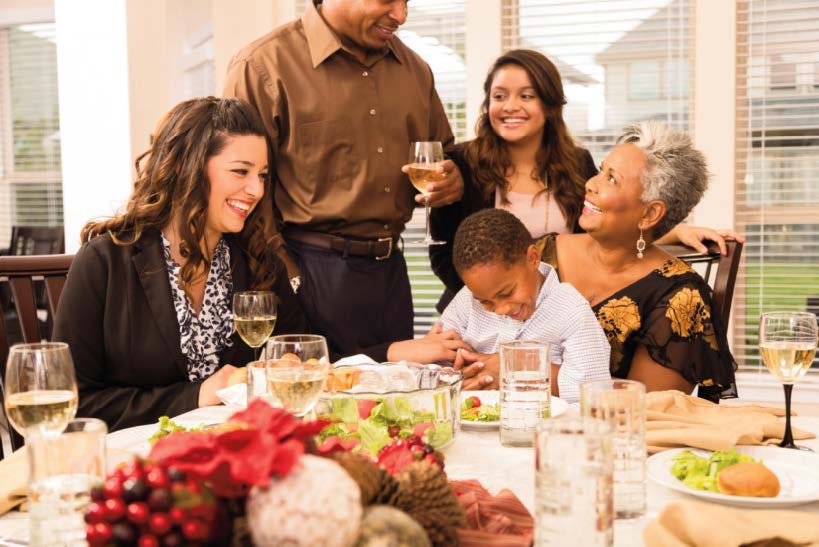
BY ANGELA SHAW
The ever-changing nature of day-to-day living is a major tradition that military families have in common with one another. The custom of constant change within the military family can serve to build resiliency and closeness within their nuclear family, but for the many members of their extended family, the incongruity of navigating the tide of change is often a stark reminder of the differences between life in a military family and the traditional family life of their cousin.
Add to this difference in lifestyle the adaptations required to support and scaffold a child with a learning or attention difference, within the family, and the chasm can feel even broader. Some initial steps to take in order to reach out, connect, and find your family's space and pace within the dual roles of military family and member of a broader extended family are explored below.
1. CONNECT: The key to maintaining family connection is to keep lines of communication with family members engaged and active. If you are fortunate enough to be with extended family this holiday season, acquaint your kids with their roots and familiarize your extended family-line with your children. Be proactive in your endeavor by keeping the family connected through the creation of a regular family newsletter throughout the year. Include in your newsletter an open-ended vibe that offers an encouraging air of invitation to true engagement. Some ideas: • Providing a positive manner of expressing your child's individualized needs and unique personality fosters positive and productive relationships. • Sharing your variation on a traditional family dish that meets the unique dietary needs of your child, such as those related to allergy or sensory, leads to understanding and encourages acceptance. • Including images or fun facts about geographic customs or points of interests within your duty station vicinity, provides authentic learning and researching opportunities for your child, as well as great opportunities for discussion and development of mutual interests with cousins, aunts, and grandpas.
2. COMMUNICATE: Share your child's heritage with them through storytelling. Share with them stories of when you were their age and include stories of the people who shared those times with you. Fill your child's sensorial system with images, tastes, smells, and music. • Oftentimes, children do not realize the relationship and connection of family outside of their home. Abstract ideas, such as relationships, are often built through experience. Storytelling through social narrative formats supports a child with special needs to access understanding through a focused and explicit channel, when provided stories are tailored to their need to understand relationships and expected behaviors. • Comparing and contrasting family traditions and customs, through presenting pictures and linking conversation, supports connection, pride, and understanding, as well as rich language experiences. • Teaching your kids some of the card games or board games you played with your family as a child will serve to frontload them, if the game is played at a holiday gathering. Tailor or modify the game to their level of ability or age.
3. EXPERIENCE: Enjoy your current duty station. Whether you are close to family or half way around the globe from them, take the opportunity to venture out to points of interest, learn new customs, and taste new foods. • Cook traditional favorites and newly discovered favorites with your child. Share with family, friends and neighbors. • Frame a favorite image of the family enjoying a local event. Mail it to grandparents or other family members back home. Have your child add a note, either dictated and written for them, or in their own handwriting. • Start the tradition of collecting a themed holiday ornament for your home from each duty station.
4. PREPARE: Choose your attendance wisely with your child in mind. Creating new traditions that work with what your family is comfortable with allows for positive practice in a safe environment. Some ideas include: • Ask the host if there is a quiet place that your child may be able to retreat to help him or her to regroup and return. • Bring a favorite toy or electronic device for your child to enjoy and recharge with, if they become overstimulated. • Respect your child's limits. Have an exit plan if those limits are met sooner than anticipated. The exit plan can include a quiet place to recharge, or a full retreat, depending upon the behavior exhibited by your child. Provide a tag-team option, if possible. Provide the opportunity for one parent to leave the event with the child who needs to exit if they become overwhelmed and allow siblings the option to stay at the event.
5. VISIT: Oftentimes, food is the central feature of a gath ering. Celebrations are often centered on a beautifully iced cake, a traditional dish, or a festive drink. When the child's behavior can be triggered by unfamiliar foods or by low blood sugar brought on by hunger, it is a good idea to proactively plan to avoid any unnecessary anxiety or stress. • Feed your child before the event or bring preferred snacks for the child to munch on in a quiet place. A good practice is to privately mention to the host that the child has been fed ahead or may be eating a simple snack, in order to support him/or her in continuing their good mood and allowing for you to focus on gathering with friends and family. • Do not let other people's insensitivity about your child's food sensitivity undermine the rules and preparation that you put in place for the comfort of your child. Keep to the plan and support your child.
6. REACH OUT: Connect and find your place within your local military community. Gather and celebrate with friends and their families from your unit. Reach out to Morale Welfare and Recreation (MWR) to discover resources available to service men, service women and their families at holiday time. In addition to the family centers at military installations that include various programs in support of the families of military personnel, there are an array of organizations that are available to military families and those who wish to support our military families. Read more about options available to military families and to those who wish to reach out and support our military families at militarybenefits.info/christmas-programs-for-military-families-in-need
ABOUT THE AUTHOR: Angela Shaw is a special educator who synthesizes her diverse education and experience to collaborate with families and staff, in order to promote success and encourage the students in her care to be life-long learners. Her publishing focus is on special education topics. Shaw's son-in-law is an active duty U.S. Coast Guard. Shaw and her husband spend much of their free time adventuring to various PCS locations and enjoying every possible minute with their son-in-law, daughter, and baby grandson.

EAT AND BE MERRY: Oftentimes, food is the central feature of a gathering. Bring preferred snacks for your child to munch on in a quiet place in order to support them in continuing their good mood and allowing for you to focus on gathering with friends and family.
IN-HOME AND COMMUNITY CARE RESOURCES
Full CirCle Home A not-for-profit organization that connects deployed service members with an opportunity to send a gift to their spouse back home. Explore this opportunity on how to access this resource or how to support our service men and service women through this organization. fullcirclehome.org
operation Home Front A non-profit organization that offers many programs for military families throughout the year. At holiday time, the organization partners with Dollar Tree to provide toys for children of military families. Additionally, other military family supports can be located at this site. Further available at this site is a link for ways to give. To register for Operation Homefront Toy Distribution, you can find the registration link here: operationhomefront.org
operation Holiday Joy Initially established with Woman's Day magazine, Operation Holiday Joy provides toys or food baskets at holiday time. Additionally, those who wish to donate can make contact through the same link. Military families can contact the Armed Services YMCA to reach out in times of need at: asymca.org